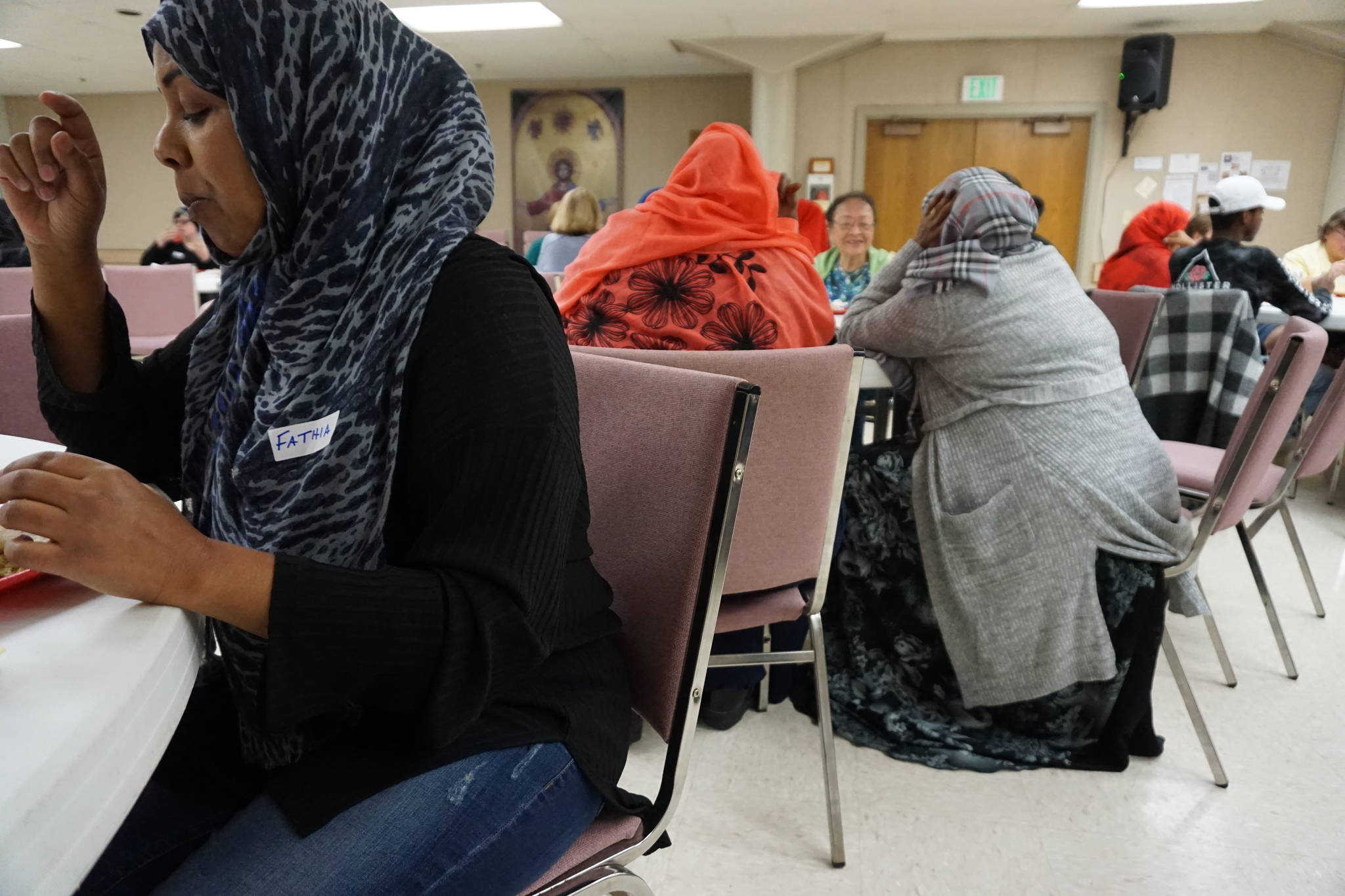In the wake of last year’s presidential election, Fathia Absie and Ilays Aden wanted to do something to change people’s perceptions of Muslims.
After all, a major plank of candidate Donald Trump’s campaign had been a promise to ban Muslim immigrants like Absie and Aden from entering the United States—a campaign pledge he either has or hasn’t tried to make good on, depending on which lawyers you ask.
“We realized we have to introduce people to one another,” says Absie. “Build bridges. Build friendships.”
The best way to do that, the two Seattle residents decided, was with food. What cultures don’t like to eat? So, on Friday night in Kent, a table in the rec room of St. James Episcopal Church was laden with a buffet of Somali dishes: Hummus, beef suqaar, basmati rice, and more.
“The green stuff at the end (nooc basbaas) is very spicy, so be careful!” Aden tells the crowd of about 40 who have gathered to break bread this night.
Dinners like these are the sole, simple mission of Absie and Aden’s nonprofit, Eat With Muslims. Since they started earlier this year, they have had 11 such dinners across King County, meeting in churches, community halls, and private homes. Absie says with each meal, the crowd grows.
“First there was 15, then 20, then 30. Tonight I’d say there’s 40,” she says.
Absie says that from the beginning, it has not been difficult to find non-Muslims eager to try different food and talk to Muslims. This night, questions float over the din of the room. “How do you know when it’s time to pray?” “Did you speak English before you came to the United States?”
Musamil Abdulahi, a 10th grader at Kentridge High School, flashes a big grin when asked how the night’s gone, talking about her culture and faith with the curious.
“It’s intense! They’ve asked me a lot of questions I don’t know,” she says with a giggle.
The Fox family came from Maple Valley to attend the dinner. While Maple Valley is not far from Kent in miles, the Foxes say they aren’t exposed to the cultural diversity that Kent has.
“I’ve been very curious what other religions are like,” says 12-year-old Kaitlyn Fox. “Schools try to be as unbiased as they can, but there’s always bias. You need to talk to people from that religion.”
Frank Smith, a parishioner at St. James, says the meal and the conversation were equal draws.
“I heard good things about the food. It lives up to the billing,” he says. “And I wanted to have a chance to fellowship with Muslims, because it’s not in my mainstream.”
Politics weren’t front and center at the dinner, but they were in the background. Earlier Friday, the Trump administration announced it would be replacing its travel ban on countries from seven majority-Muslim nations with a new program focused on yet-unnamed nations that the administration feels doesn’t do enough to prevent crime and terrorism. The ACLU told the New York Times the policy “ seems to be a third rescue of the failed Muslim ban” (on Monday, the Trump administration released specifics on the travel restrictions, which includes blocking any further immigration from Somalia, among other things), Meanwhile, Eat With Muslims was one of more than two dozen organizations to receive a portion of King County’s recently created “resilience fund” for immigrant and refugee support organizations. A partnership with the Seattle Foundation, the resilience fund is part of a total $2.25 million in immigrant-support funding allocated by King County, Seattle, and the Seattle Foundation following Trump’s election.
This was the first dinner hosted at St. James. The Rev. Joyce Perry Moore, rector of St. James, says she’s not surprised by the strong turnout for the dinner. She grew up in Auburn, and when she moved back to Kent as an adult was pleasantly surprised by the ethnic diversity the city now enjoys. But she says it can be hard to make connections.
“Sometimes we don’t ask question of one another because we’re embarrassed,” she says. Later in the night she and Absie will perform a play in which a Muslim and Christian ask each other such embarrassing questions about their faiths and culture. The moral of the play is that a good conversation can go a long way toward clearing up fear and misconceptions.
“There are people with a good heart who don’t know how to make a connection,” she says. “We don’t want to feel afraid and disconnected. We want to feel connected. That’s a very human thing.”
dperson@seattleweekly.com
You can learn more about Eat With Muslims on their website, eatwithmuslims.org.








